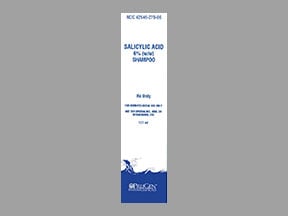
My prescription
Edit
177ML of 6%, Salicylic Acid (1 Bottle)
Select pharmacy

CVS
$96.68
COUPON PRICE
Walmart
$53.65
COUPON PRICE
Walgreens
$69.76
COUPON PRICE
Albertsons
$381.25
COUPON PRICESalicylic Acid savings card
Show this card to your pharmacist
Walmart
$53.65
BIN
ID
PCN
GRP
015995
LHKPW922211
GDC
DR33
Powered by
More prescriptions for warts
More prescriptions for warts
Price history for Virasal (brand) & Salicylic Acid (generic)
1 Bottle, 177ML of 6%
Average retail price for Virasal
Average retail price for Salicylic Acid
Average SaveHealth price for Salicylic Acid
Our price history data is based on aggregated prescription data collected from participating pharmacies in America. Our prescription data updates daily to reflect the latest price changes. If you notice a missing data point, it means there wasn't sufficient data available to generate a monetary value for that date.
We analyzed Salicylic Acid prices for (177ML of 6%, 1 Bottle) over the last 12 months. The average retail price was $767.39, while the average price using the SaveHealth discount card was $208.64. That's a savings of approximately 72.81% when using our Salicylic Acid coupon.
Compared to the generic version, Virasal had an average price of $516.65 over the same time period. With the SaveHealth savings card, Salicylic Acid is 59.62% cheaper on average than Virasal.
*Retail prices are based on pharmacy claims data, and may not be accurate when we don't have enough claims.
Salicylic Acid dosage forms
Dosage Quantity Price from Per unit 1GM 1 Bottle $1.01 $1.01 1GM 2 Bottles $1.01 $0.51 1GM 3 Bottles $1.01 $0.34 10ML of 26% 1 Bottle $163.75 $163.75 10ML of 26% 2 Bottles $309.21 $154.60 10ML of 26% 3 Bottles $462.66 $154.22 100GM 1 Bottle $10.25 $10.25 100GM 2 Bottles $39.48 $19.74 100GM 3 Bottles $68.72 $22.91 100GM of 50% 1 Bottle $64.05 $64.05
| Dosage | Quantity | Price from | Per unit |
|---|---|---|---|
| 1GM | 1 Bottle | $1.01 | $1.01 |
| 1GM | 2 Bottles | $1.01 | $0.51 |
| 1GM | 3 Bottles | $1.01 | $0.34 |
| 10ML of 26% | 1 Bottle | $163.75 | $163.75 |
| 10ML of 26% | 2 Bottles | $309.21 | $154.60 |
| 10ML of 26% | 3 Bottles | $462.66 | $154.22 |
| 100GM | 1 Bottle | $10.25 | $10.25 |
| 100GM | 2 Bottles | $39.48 | $19.74 |
| 100GM | 3 Bottles | $68.72 | $22.91 |
| 100GM of 50% | 1 Bottle | $64.05 | $64.05 |
| 100GM of 50% | 2 Bottles | $147.09 | $73.55 |
| 100GM of 50% | 3 Bottles | $230.13 | $76.71 |
| 177ML of 6% | 1 Bottle | $96.68 | $96.68 |
| 177ML of 6% | 2 Bottles | $175.05 | $87.53 |
| 177ML of 6% | 3 Bottles | $261.43 | $87.14 |
